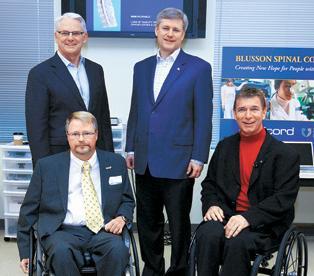The Rick Hansen Institute Is Narrowing Its Focus to Produce Maximum Impact for Canadians with Spinal Cord Injuries—and It’s Going Global
By Bill Barrable, CEO, Rick Hansen Institute
On March 21, Rick Hansen officially kicked off the 25th-anniversary celebration of his Man In Motion world tour. Both Prime Minister Stephen Harper and B.C. Premier Gordon Campbell attended the event, held at the Blusson Spinal Cord Centre in Vancouver. The two leaders announced a total of $38.5 million in support of Hansen’s two-year quest to raise an additional $200 million for spinal cord injury (SCI) research and innovations.
Those who saw national TV and print coverage of the event heard the Prime Minister, the Premier and Hansen himself describe how a portion of funds would be allocated to the Rick Hansen Institute (RHI).
RHI is, of course, the former SCI Solutions Network. Our Board of Directors voted to change our name, effective January 1, 2010, to acknowledge the incredible leadership and dedication to the SCI cause that Hansen has demonstrated for the past 25 years. The March 21st event served as the organization’s official relaunch under the new banner.
While the name has changed, our mission remains unchanged: minimizing disability and maximizing the quality of life for Canadians with SCI. We also remain committed to three primary work areas: supporting SCI translational research; identifying and implementing best practices in SCI care; and improving the quality of life of Canadians with SCI through partnerships with key community organizations, including the Canadian Paraplegic Association.
However, with renewed funding in place, we are now narrowing our focus. Our Board of Directors is committed to bringing real change to the lives of people with SCI. As a result, our Board has directed us to concentrate our efforts on work that promises to deliver maximum impact to Canadians with SCI, in the shortest time frame possible.
At the same time, we’re expanding our scope internationally, working increasingly with partners in other countries who share common goals. This is allowing us to share costs and expand the scale of key projects. The result will be greater impact for people with SCI here in Canada and abroad.
What exactly does this mean? In the case of our Translational Research Program, funded primarily by Health Canada, it means moving forward with fewer projects in areas that are promising and deemed to be high priority by people with SCI. Simply explained, translational research is applying knowledge gained in the lab to human-based studies. Many of our earliest funded projects have yielded excellent results, with more expected throughout this year. Now we’re applying those results to the most promising and critical areas.
Highlights include two RHI-supported multi-centre Canadian clinical trials. The first, led by Vancouver’s Dr. Brian Kwon, involves analyzing spinal fluid immediately following injury to predict outcomes months and years after injury.
The second, led by Halifax’s Dr. Steve Casha, will seek to verify if the common antibiotic minocycline can minimize the spread and impact of secondary damage if administered immediately after injury. Also, we’re doing more work on the secondary health complications of SCI. With input from people with SCI, we’ve identified pressure ulcers, neuropathic pain and bladder management/urinary tract infections as three areas requiring immediate attention. Even modest advances in these areas will yield great quality of life improvements for people with SCI—and enormous cost savings for our health care system.
We’re also embarking on international collaborations with our research. For example, we recently announced a partnership with Queensland, Australia, which will become a Rick Hansen SCI Registry partner site and join a project we have initiated to determine best practices in SCI care, from emergency response through acute care and rehabilitation. Other collaborations are being explored in the United States with the Christopher and Dana Reeve Foundation and the Paralyzed Veterans of America.
We are also moving forward with a strategy on best practices implementation, with the hiring of a director to lead a team and program that will seek to identify best practices in SCI care—and promote their implementation across Canada.
Finally, with our Community Partnerships Program, we’re actively working with the Canadian Paraplegic Association and other community partners, such as the Canadian Wheelchair Sports Association. The goal is to collaborate and find ways of improving the quality of life of people with SCI across Canada.
In the words of our Board Chair, Daryl Rock, “Our success will depend a great deal on how effectively we reach out to engage our constituents—people living with SCI.”
Let us connect with you. Visit www.rickhanseninstitute.org and sign up for your free subscription for our quarterly Solutions magazine and other electronic updates. We’ll keep you updated about research breakthroughs, upcoming clinical trials, the benefits of our community participation programs and the work of our partners across Canada.















